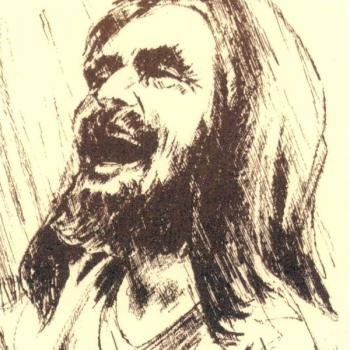Herbert was convinced that the best way to admonish and advise his parishioners was not with his prose but with proverbs. Herbert is responsible for such maxims as: "Sometimes the best gain is to lose," "Storms make the oak grow deeper roots," "Speak not of my debts unless you mean to pay them," and "Prayer should be the key of the day and the lock of the night." Even more than his proverbs, it was his poetry that plumbed the heart's deepest depths.
Here's one entitled "The Pulley":
When God at first made man,
Having a glasse of blessings standing by;
Let us (said he) poure on him all we can:
Let the worlds riches, which dispersed lie,
Contract into a span.
So strength first made a way;
Then beautie flow'd, then wisdome, honour, pleasure:
When almost all was out, God made a stay,
Perceiving that alone, of all his treasure,
Rest in the bottome lay.
For if I should (said he)
Bestow this jewell also on my creature,
He would adore my gifts in stead of me,
And rest in Nature, not the God of Nature :
So both should losers be.
Yet let him keep the rest,
But keep them with repining restlesnesse :
Let him be rich and wearie, that at least,
If goodnesse leade him not, yet wearinesse
May tosse him to my breast.
For Christ to be our rest indicates that Christ is the culmination of Sabbath. He is the rest toward whom the commandments point. Not that the Pharisees would ever see that. Granted, they did reason that for God to rest did not mean that God himself stopped working. If he did, all of nature, providence, and life itself would stop working too. Did this make God himself a Sabbath breaker? No. As the Lord of the Universe and Author of the Law, working on the Sabbath was something God was allowed—albeit God and God only. Which is why work on the Sabbath was so ferociously prohibited. For a human to work on the Sabbath was more than disobediently refusing to rest. It represented a deliberate grab for a piece of divine prerogative. To work on the Sabbath meant you considered yourself to be on par with God.
Which is precisely why Jesus infuriated the Pharisees so. Not only did he do work on the Sabbath, he declared it his right to do so. Verse 17: "My Father never stops working," Jesus said, "so why should I?" Jesus not only broke the Sabbath rules, he stirred blasphemy into the mix by calling God "my Father." So perfect was Jesus' submission and obedience to his Father's will that it was impossible to distinguish between God's doings and Jesus' own. The two were identical. This led Jesus to eventually declare in John 10—to everybody's astonishment but nobody's confusion—"I and the Father are one." "Whoever does not honor the Son," Jesus said in verse 23, "does not honor the Father, who sent him."
Yet the Pharisees just couldn't see it. How could they? Their Sabbath-keeping left no room for joy. Their legalism left no room for grace. The achievement-oriented obedience left no room for Jesus. It's like with so many Christians since: the gladness at first of being saved dissipates into the ever-increasing burden of staying saved. I remember one friend in college telling me how he'd stopped going to church because for the first time in his life he wanted to experience something on Sunday besides guilt.
It shouldn't be that way. Sabbath celebrates not only life made good but the promises of greater life and goodness to come. "There remains a Sabbath-rest for the people of God," the book of Hebrews declares. Revelation concurs, "'Blessed are the dead who from now on die in the Lord.' 'Yes,' says the Spirit, 'they will rest from their labors.'" Jesus Christ as the Lord of the Sabbath declares himself the source of that Sabbath rest: "Come unto me, all yethat labor and are heavy laden, and I will give you rest . . . My yoke is easy and my burden is light."
George Herbert enjoyed but three years of active ministry before succumbing to tuberculosis in 1633 and entering his rest. Nevertheless, his short life and words made such an impression that the Episcopal calendar honors him on February 27.
I leave you with two stanzas from his poem, "Even-Song":
Blest be the God of love,
Who gave me eyes, and light, and power this day,
Both to be busy, and to play.
But much more blest be God above,
Who gave me sight alone,
Which to himself he did deny:
For when he sees my ways, I die:
But I have got his son, and he hath none.
I muse, which shows more love,
The day or night: that is the gale, this th' harbour;
That is the walk, and this the arbour;
Or that is the garden, this the grove.
My God, thou art all love.
Not one poor minute 'scapes thy breast,
But brings a favor from above;
And in this love, more than in bed, I rest.





